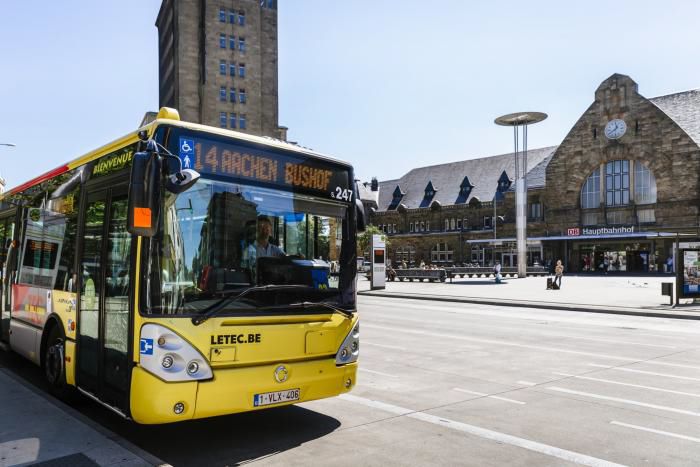The Interreg EMR Connect project seeks to improve public transport in the Euregio Meuse-Rhine (EMR) region. The project has improved cross-border cooperation between public transport operators in Germany, Belgium and the Netherlands, created new tariffs, tested new technologies, and expanded services like e-bike-sharing. The 14 project partners are public transport operators, local authorities, and universities.
Improving cross-border public transport in the Euregio Meuse-Rhine
- 01 June 2022
“To facilitate a sustainable network, EMR Connect tackles current challenges in cross-border local public transportation. These range from improvements in prices and services and digitalisation of ticket and passenger information, to the use of e-buses and connecting different transportation means.”
Thanks to the project, bus and train tickets for students in Aachen, which were valid only in the German state of North-Rhine Westphalia, were extended to the Dutch province of Limburg in 2019. Aachen’s Velocity bike-sharing network opened a station in the Netherlands. Another 20 stations are planned for the Netherlands.
A pilot project in 2018 demonstrated that ticketing using ID cards contributes to smooth cross-border mobility. A study was financed in support of a German initiative to develop a distance-based tariff that can be combined with the Dutch one to simplify cross-border travel fees.
Another study showed that a direct train connection between Aachen and Liège, Belgium, is possible and the goal is to enable this in upcoming years. The three participating universities organised seminars and summer schools focused on mobility and helped the project partners develop their network.
Transport links foster the development
Public transport is important for regional development, but cross-border areas often lack these connections. Overcoming this is hampered by different national ticketing and tariff systems. The project’s major achievement has been the cooperation of all public transport operators in the border area.
The most important project milestone will be the test and implementation of an innovative interoperable ticketing system between Germany and the Netherlands, and that can be expanded to Belgium.
ID-based ticketing allows travellers to cross borders using one method linked to a central account. The ID-based solution is being implemented in combination with a smartphone-based check-in, check-out function. The system for exchanging traveller and ticket data across the Dutch-German border could potentially be expanded to other European border regions.
Bike ticket
To make exploring the Euregio Meuse-Rhine by bike easier, a ticket costing EUR 4 lets people take their bicycles on trains in the Dutch and German parts of the EMR. It was introduced in January 2020 and is available via the German DB Navigator app. Although it is also valid on Belgian SNCB trains, the ticket is not sold in Belgium.
Project delay
The project was intended to run for three years starting in October 2017. However, national decisions on tariffs were delayed, and national funding was needed for a planned ticketing project involving partners from outside the EMR region. COVID-19 caused further delays and the project was extended to March 2022.
Total investment and EU funding
Total investment for the project “EMR Connect” is EUR 4 617 974, with the EU’s European Regional Development Fund contributing EUR 2 308 987 through the “Interreg Euregio Meuse-Rhine” Cooperation Programme for the 2014-2020 programming period. The investment falls under the priority “Furthering regional integration and institutional cooperation.”

